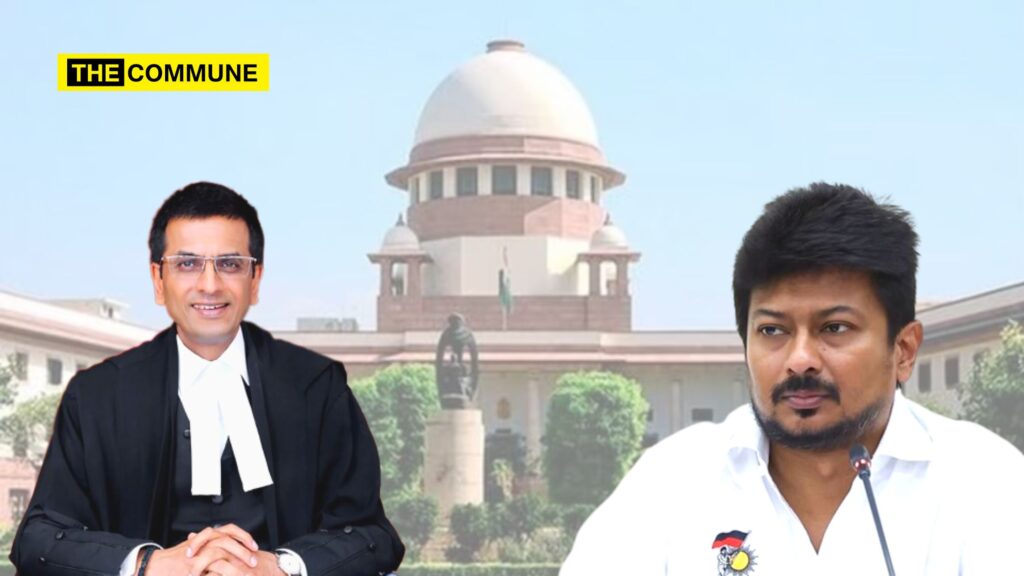A bench led by Chief Justice of India DY Chandrachud in the Supreme Court declined to urgently hear a Public Interest Litigation (PIL) titled “B Jagannath vs State of Tamil Nadu.” It was filed against Tamil Nadu DMK Minister Udhayanidhi Stalin concerning his recent remarks on Sanathana Dharma.
#BREAKING #SupremeCourtofIndia REFUSES urgent hearing of a petition filed seeking registration of FIR against #UdhayanidhiStalin for his comments on #SanatanaDharma pic.twitter.com/v99J9idsk0
— LawBeat (@LawBeatInd) September 15, 2023
The Chief Justice of India declined to entertain the plea filed by a lawyer from the Madras High Court, citing that it had not been listed for urgent consideration and that the Standard Operating Procedure laid out by the court needed to be followed.
In the filed plea, the lawyer sought a declaration that the participation of State Ministers in the meeting titled the “Sanathana Dharma Eradication Conference,” held on 2 September 2023, be deemed unconstitutional and in violation of Articles 25 and 26 of the Constitution of India. Additionally, the plea requested a directive for the Director General of Police of the State of Tamil Nadu to promptly register an FIR against the organisers of the conference and those involved in hate speech, including Udhayanidhi Stalin, PK Sekar Babu, and Peter Alphonse.
Earlier this month, another plea was submitted to the Supreme Court, urging the police to register an FIR against Tamil Nadu Chief Minister M K Stalin’s son, Udhayanidhi, and former Union Minister A Raja for their alleged derogatory remarks and calls for the eradication of Sanathana Dharma.
Advocate Vineet Jindal filed an interlocutory application in the writ petition initiated by Shaheen Abdullah. The Supreme Court had directed all States and Union Territories on April 28, 2023, to initiate suo motu FIRs in cases involving offenses such as Section 153A, 153B, 295A, and 506 of the Indian Penal Code, regardless of whether a formal complaint was filed. The court had also emphasized that any reluctance to comply with this directive would be seen as contempt of court, and appropriate action would be taken against the responsible officers.
Recently, a group comprising former judges, retired bureaucrats, and Army veterans wrote a letter to Chief Justice of India D Y Chandrachud, urging him to take suo motu contempt action against the Tamil Nadu government due to its alleged failure to address the “hate speech” made by Udhayanidhi concerning ‘Sanathana Dharma’. On September 5, the group conveyed its concerns about potential communal discord and sectarian violence arising from Udhayanidhi Stalin’s comments, citing the order issued in the Shaheen Abdulla case.
However, the same court readily agreed to facilitate an urgent bail hearing for alleged activist Teesta Setalvad in July this year. The CJI is also alleged to have been contacted multiple times by Setalvad when he was in the middle of a dance programme.
Somewhere the person who called multiple times during a dance recital is smiling. https://t.co/D1KRcyyaZ4
— Sunda (@sunda_m) September 15, 2023
But urgent hearing for Teesta setalwad? https://t.co/CNrEnN2vJi
— VAYU PUTRA (@TrisonicFoxbat) September 15, 2023
This urgent hearing took place late at night on a Saturday, leading critics to argue that the court displays bias in its approach to urgent matters.
Only Milords the best what is urgent, for example- Yakub Memon’s mercy plea https://t.co/C1mhSzykcj
— Vipra Shrivastava☀️ (@Vipra_s) September 15, 2023
Interestingly, the Supreme Court issued instructions to all states and Union Territories, urging them to initiate cases against hate speech, even in the absence of a formal complaint.
Consistent. https://t.co/4EEOBgGhkV pic.twitter.com/ACxbGSvTuH
— InherentlyCurious (@malludoc) September 15, 2023
Netizens also questioned the Supreme Court’s apparent inconsistency regarding freedom of speech, citing the Nupur Sharma episode as an example.
@SCofInd @MLJ_GoI @pmo @PMOIndia Mi Lords, you shut Nupur Sharma but Rehmani roaming free.. Now Stalin, A Raja, Kharage, Jagdanand Singh… abusing Hindus and asking for eradication of Sanatan Dharma will roam free..and continue abusing? Court should never appear to have any bias https://t.co/y28EXT7f0A
— VK Mishra (@1957VKMishra) September 15, 2023
(With inputs from Lawbeat India)

